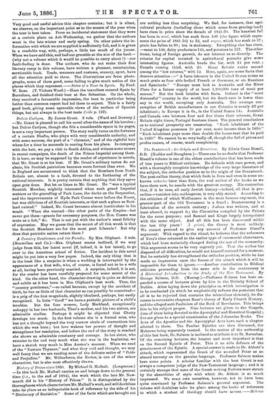History of Prices since 1850. By Michael G. Mulhall. (Longmans.)
—In this book Mr. Mulhall carries on and brings down to the present time (i.e., to the end of 1884), the work which the late Mr. New- march did in his " History of Prices." It is distinguished by the thoroughness which characterises Mr. Idalhall's work, and will doubtless take its place as an indisputable book of reference by the aide of his "Dictionary of Statistics." Some of the facts which are brought out
are nothing leas than surprising. We find, for instance, that agri- cultural products (including those which come from grazing-land) have risen in price since the decade of 1841-50. The heaviest fall has been in wool, which has sank from 100 (the figure which repre- sents the price of 1811-50) to 52, and sugar, which has sunk to 57 ; grain has fallen to 93 ; tea is stationary. Everything else has risen, —meat to 148, dairy products to 144, and potatoes to 157. The other items, being of foreign growth, do not interest us so directly. The returns for capital invested in agricultural pursuits give some interesting figures. Australia heads the list, with 24 per cent. ; Canada coming third, with 20. Great Britain ranks second among the "low returns," with 12. Here, again, are some facts that deserve attention :—" A farm-labourer in the United States raises as much grain as four able-bodied French or Germans, or six Russians and Spaniards." "Europe must look to Australia and the River Plate for a future supply of at least 1,200,000 tons of meat per annum." But the book bristles with facts. Ireland is the " most distressful" country in the world, but its death-rate is lower than any in the world, excepting only Australia. The average con- sumption of British manufactures in our Colonies is nearly £5 per inhabitant ; in Europe it ie as., in the United States 14s. Australia and Canada owe between four and five times their revenue, Great Britain eight times, Portugal fourteen times. The general conclusions as to national prosperity are reassuring. " Each inhabitant of the United Kingdom possesses 70 per cent. more income than in 1850." "Each inhabitant pays more than double the house-rent that he paid in 1850." We cannot be so very badly off, though the fall of prices and profits causes, of course, much complaining.


































 Previous page
Previous page